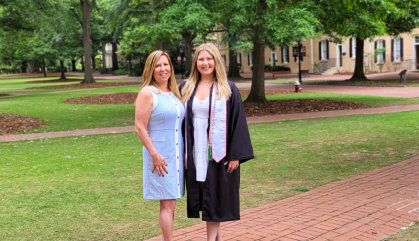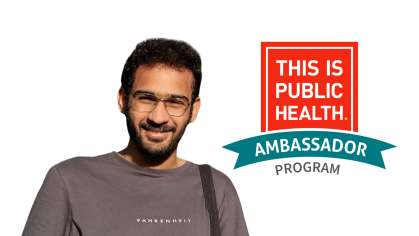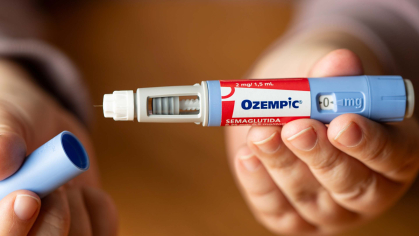Lisa and Jillian Gulla’s individual pursuits in public health reflect a shared dedication, echoing their family's commitment to improving health outcomes.
The Gulla family has a deep connection to the public health profession. Lisa Harrison Gulla and her daughter Jillian Gulla are both pursuing graduate degrees at the Rutgers School of Public Health.
Lisa, a retired health officer, is a Doctor of Public Health (DrPH) candidate. With a background in psychology, she initially focused on addiction treatment through one-on-one interactions. Over the years, her career evolved, leading her to work in local public health and eventually to pursue a DrPH. Her daughter, Jillian, a neuroscience graduate from the University of South Carolina, is embarking on her Master of Public Health (MPH) in Health Systems and Policy. Motivated to effect systemic change in health administration, Jillian's decision to return to New Jersey for her graduate studies was driven by Rutgers' reputation in research and academics.

Their story, rooted in a family legacy of health sciences, showcases a shared commitment to advancing public health, each through their unique perspective and expertise. The following Q&A delves deeper into their motivations, experiences, and aspirations within public health.
How have your educational and professional backgrounds led you to pursue a career in public health? Why did you continue your education at the Rutgers School of Public Health?
Jillian: I was part of the first graduating class in Neuroscience at the University of South Carolina. I've always been passionate about understanding the brain's complexities, specifically in neurodevelopment and neurodevelopmental disorders.
Although much of my degree and path thus far focused on research, I’ve grown up with exposure to public health from my mother’s career. In my undergraduate studies, I learned more about how various biological sciences, research, and medicine intertwine with public health. This knowledge has inspired me to improve public health systems, so I am pursuing a Master of Public Health Degree in Health Systems and Policy at the Rutgers School of Public Health, which I started in January. I attended the University of South Carolina to diversify my experiences growing up in New Jersey. However, I knew for my graduate degree that I wanted to return to my roots and attend Rutgers, which has a strong reputation in research and overall health sciences opportunities.
Being that my degree was a concentration in neurodevelopment, as well as a family member having a rare form of epilepsy, I have personally observed the need for continued research and resources that families deserve.
Lisa: I pursued my MPH in Health Education at the school, receiving my degree in 2003. This program helped me gain a deeper understanding of public health from a broader perspective, complementing my previous experience in psychology and community-based work.
My decision to join Rutgers was influenced by several factors. I had been waiting for the new DrPH program since I completed my MPH at the school. I remember stopping Leslie Kantor, chair of the Department of Urban-Global Public Health, at an event to discuss the DrPH program in Leadership, Practice, and Research and how exciting it was that this new curriculum was finally being launched. And, of course, the school’s high rank as one of the top 25 schools and programs in public health further convinced me of Rutgers’ quality education.
What are your goals and aspirations in public health?
Jillian: We have a long history in healthcare, so I was consistently exposed to it through my undergraduate education. More importantly, epilepsy hit close to home for me and drew me into psychology and neuroscience before I ever even went to college. With such a rare and not well-researched type, we have seen how impactful further research would be, so I have always figured that others likely lack information and resources too. Many of those people may have far fewer resources than my family, so if I could help provide those resources and produce research to help others in similar situations, why shouldn’t I?
My main goal is to bring about systemic change in health administration, particularly to address inequity and corruption within the system. Watching my mom struggle with these challenges at the local and community level deeply influenced me. The dream is to “rewrite the medical system” and make it more transparent and effective.
In addition to making healthcare more accessible to the masses, I want to return to my path of neuroscience research to find further information and provide it to those in situations similar to my family's.
Lisa: Initially, my career focus was on addressing addiction through one-on-one treatment. However, over the last 30 years, my path shifted towards a broader perspective, eventually leading to me becoming a licensed health officer (now retired), a consultant, a professor, and a DrPH candidate. This journey represents a progression from treatment to prevention and, subsequently, public health as a profession.
While working in treatment, I also conducted substance use prevention classes for K – 6 youth. Realizing my passion lay in health education and prevention as a public health science, I pursued my second master's degree, an MPH in Health Education. This decision was influenced by a mentor who encouraged me to obtain my health officer license and join the New Jersey Association of County and City Health Officials (NJACCHO), where I discovered my passion for teaching and advocacy.
As a member of NJACCHO's Executive Committee and the recent Past President of the New Jersey Public Health Association, I engaged in various legislative efforts, advocating for policy change. Now, as an educator, I aim to inspire students not only for public health but for advocating meaningful change in the profession.
In pursuing my DrPH, my dissertation focuses on the local public health system in New Jersey, titled "Perceptions, Experiences, and Symptoms of Mental Health Conditions of Governmental Public Health Workers in New Jersey Post COVID-19 Pandemic." I aim to provide data advocating for a stronger governmental public health system. The need for real data on the New Jersey governmental public health workforce's mental health conditions and stressors/resources post-COVID-19 has driven this process and aims to collect baseline data for advocacy and future resources to alleviate stressors during major public health events.
My initial decision to specialize in addictions was influenced by my father's death from addiction. As for education, my family instilled a respect for learning, with my grandfather emphasizing that as long as you are learning, you are alive. This respect for education guided me from a desire to be a teacher to becoming a counselor and eventually led me to my current path in public health.
As a mother and daughter now studying at the Rutgers School of Public Health, how do you feel you may influence each other’s journeys in the profession?
Lisa: While our public health paths have similarities, like our shared commitment to systemic change and our choice of Rutgers for further education, we are distinct individuals with different expertise and approaches.
As I am finishing my journey and Jillian starts hers, I hope that I can be a role model to her to keep pushing even when you are most frustrated; as a teacher, I want to be a resource for her, and as a mom, I will continue to be her biggest cheerleader. As Jillian starts her classes and we discuss what she is learning, she will continue to inspire my passion for public health.
Jillian: My focus is more on the systemic issues in health administration, while my mom’s (Lisa's) career has evolved from psychology to policy and health education. Our journeys reflect our unique perspectives and contributions to the public health profession.
I have a great privilege from my mom’s experiences with Rutgers and her years in public health because I can come home from class to talk about what I’ve learned and brainstorm ideas for change I’d like to make in my career. While we are at very different points in our time at Rutgers, it’s like I have a teammate for figuring out how to tackle my dreams.
What advice would you give young individuals, especially women, aspiring to enter public health?
Lisa: The public health profession has changed so much since I started. It was predominantly male-run, with women working mostly as health educators and public health nurses, and now, there are so many women leaders in New Jersey and nationwide.
It is exciting to see, and I hope we can develop their advocacy skills because we need strong, influential women to continue the fight.
Jillian: While considering and exploring many different options for approaching the changes I want to see in the healthcare system, I have battled with the feeling of not knowing how to do it and how to get there. My biggest advice is to consider all your options and know that if one is not right for you or occurs at the wrong time, it’s okay to pivot and find another way to get where you want to go.
There isn’t a “correct” order or pace to find where you are supposed to be; the only thing that matters is what you want to achieve and knowing you will make it.


